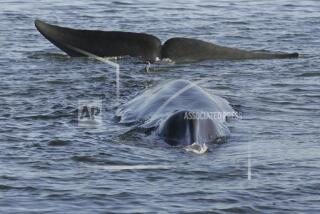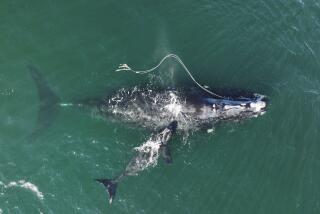The Whale Watch
- Share via
At last the international moratorium on whaling is at hand. By 1988 commercial whaling will be suspended by all nations. There will remain only whaling for scientific purposes or to honor traditional access to limited coastal fisheries, such as those of the American Eskimos.
The Soviet Union, second after Japan among the whaling nations of the world, has now agreed to honor the moratorium in 1987. The Soviets already had lost major fishing rights to American waters under terms of legislation that penalizes nations not abiding by the whale-protection effort, and the Soviet fishermen would have faced even more restrictive limits had their government not agreed to the moratorium.
Japan already had agreed to withdraw its objections to the moratorium effective in 1988. And its conformity could come sooner if litigation now in process breaches an agreement by the American government to postpone the imposition of restrictions on Japanese fishing vessels in U.S. waters. Faced with a choice between fish and whales, Japan almost certainly would do what Moscow did and choose fish.
The International Whaling Commission has now put North Atlantic minke whales on the protected list. That will probably bring the third major whaling nation, Norway, to accept the moratorium.
There remain some troubling whaling operations. South Korea and Iceland, for example, are asserting a right to take as many as 200 whales a year for scientific purposes, but there is a good chance that the commission will complete more restrictive rules for scientific catches at its meeting next June in Sweden.
The moratorium will assure the survival of most species. For some it may already be too late to prevent extinction. A scientific study of stocks will be completed by 1990, providing a better picture of the situation. There is good reason to believe that it will confirm both the wisdom of the moratorium and the desirability of making it permanent.
More to Read
Sign up for Essential California
The most important California stories and recommendations in your inbox every morning.
You may occasionally receive promotional content from the Los Angeles Times.













